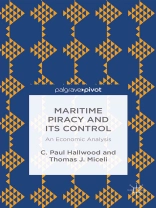Maritime Piracy and its Control develops an economic approach to the problem of modern-day maritime piracy with the goal of assessing the effectiveness of remedies aimed at reducing the incidence of piracy.
Зміст
1. The Scope of the Problem: History, Trends, and Current Facts 2. Pirate Organization: Yesterday and Today 3. Somali Piracy: For the Money of for the Honor? 4. An Economic Model of Maritime Piracy: Part 1, Pirates and Shippers 5. An Economic Model of Maritime Piracy: Part 2, Optimal Enforcement of Anti-Piracy Laws 6. Reform Proposals: Part 1, Apply the SUA Convention to Piracy 7. Reform Proposals: Part 2, Apply Civil Aviation Laws to Piracy and Use the International Criminal Court to Try Pirates 8. Piracy in the Golden Age, 1690-1730: Lessons for Today 9. Conclusion: The Mystery of International Law
Про автора
Author C. Paul Hallwood: C. Paul Hallwood received his Ph.D. in economics from the University of Aberdeen in 1988, and is currently Professor of Economics at the University of Connecticut, USA. Prior to that, he was in the Department of Economics at the University of Aberdeen, UK. He also held the position of Senior Research Economist in the Foreign Ministry of a prominent Arab Government, and has served as a visiting professor at various universities in the USA, Europe, and Australia. His principal research interest is in international economics, having published books and papers in each of its four main fields: international trade, international finance, economics of multinational corporations, and international political economy. A more recent research interest is in the economics of the oceans, on which he has published a textbook and papers on matters such as the law and economics of historic shipwrecks, and the law and economics of maritime piracy. He has also published two books and several paper on the Author Thomas J. Miceli: Thomas J. Miceli received his Ph D in Economics from Brown University, USA, in 1988, and he has been Professor at the University of Connecticut, USA, since 1987. His research is largely in the area of law and economics, with particular emphasis on land use and property law. He is a recognized authority on the economics of eminent domain, a subject on which he has authored or co-authored three books. He has also published undergraduate and graduate level textbooks on law and economics. Currently, he serves as an associate editor for the International Review of Law and Economics. While at UConn, he has taught courses at both the undergraduate and graduate levels in microeconomic theory, urban economics, public finance, and law and economics, and in 2009, he won the Grillo Family Faculty Award for Excellence in Teaching in the Economics Department.












